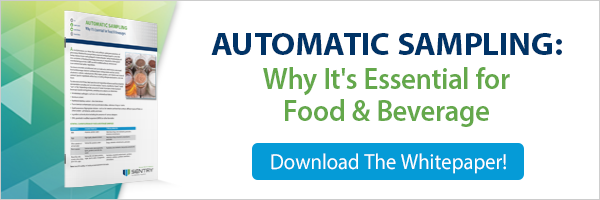
As consumers’ tastes change, nut butter producers and co-packers are optimizing their processes to meet this consumer demand. With the variety of options and process variability, it has become imperative to utilize proper sampling techniques to prevent cross-contamination.
Automatic representative sampling helps producers meet these challenges while maintaining consistency, compliance and variability in their processes.
The Risks of Contamination
The U.S. Food and Drug Administration (FDA) requires that product labels call out the specific nut used and if any cross contamination (soy, nuts, etc.) exists. If a producer doesn't meet these testing and labeling requirements, they can be vulnerable to civil sanctions and fines, criminal penalties, and food product seizure.
Nut butter development, however, is often exposed to many potential contaminants within their processes. Contaminants can enter at any point throughout the harvesting, shelling, blanching and grinding operations.
Physical contaminants. Glass, metal, sticks and plastic can come from agricultural sources during harvesting from the ground or trees. If not removed from the final product, they can enter our food supply and cause contamination.
Chemical impurities. Improper storage of pre-and post-processed nuts can cause toxins, such as aflatoxin and mycotoxins from molds. If eaten by consumers, strong allergic reactions, some requiring hospitalization, could occur.
Biological hazards. Parasites, viruses and pathogens like listeria and salmonella can occur in raw nuts or can be introduced throughout the manufacturing process. These are some of the most dangerous contaminants. If consumed, individuals will require hospitalization and have lasting future effects such as blood infections or meningitis.
Automatic Sampling is Essential for Nut BUtter Production
A consistent, repeatable sampling program provides a representative composite sample at every stage of nut butter processing.
Bulk solid samplers are able to identify key physical contaminants during the separation process, while other automatic samplers work with pre and post pasteurized products to ensure that chemical impurities and biological hazards aren't present.
Improve Safety and Quality. Nut butter sampling maintains the consistent quality and safety of your product.
- Removes human bias
- Minimizes physical, chemical and biological contaminants
- Ensures pasteurization is complete
- Maximizes process efficiency to meet output goals
- Mitigates the risk of fines, bacterial outbreaks and product recalls
Ensure Physical Properties. Automatic sampling ensures proper representation of chemical composition, viscosity, consistency, color, and alignment with the product recipe.
Meet Federal Requirements. From raw product to finished nut butter, regulations require regular chemical, physical and biological contaminants testing to ensure quality and consistency.
Representative samples help optimize quality and reduce human bias while ensuring the finished product is free of allergens and labeled to meet FDA standards.
Allow for Process Modification. The nut butter industry is continuously changing to meet growing consumer demand and evolving diets. Producers and co-package companies often need to quickly adapt manufacturing processes to keep pace with shifting tastes, requirements and legislation.
Automatic nut butter sampling systems rapidly adjust to these new products and viscosity and help optimize sampling accuracy and repeatability while minimizing the risks associated with updating production processes.
Ensure your product and bottom line remain safe with Sentry Equipment.
Our representatives ensure you have the expertise you need from separation to pasteurization. With automatic sampling equipment, education and parts, our team ensure your sampling will remain representative.
Contact us at +1-262-567-7256, or complete our online contact form for more information.




